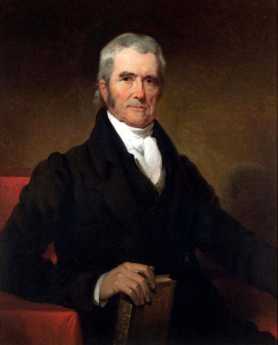Related Topics
George Washington in Philadelphia
Philadelphia remains slightly miffed that Washington was so enthusiastic about moving the nation's capital next to his home on the Potomac. The fact remains that the era of Washington's eminence was Philadelphia's era; for thirty years Washington and Philadelphia dominated affairs.
..Constitution and Court
Forget all those lawyer jokes you hear. The American legal profession can rightly be proud of the Federal Court System, an achievement of the whole profession. America may be legalistic and overlawyered, but that reflects the rule of law dominated by lawyers. Curiously, the leader of this creation, John Marshall, was not so much a legal theoretician as a relentless Federalist lawyer, determined to reshape the legal profession to be worthy of power.
.......................................Marshall

|
| John Marshall |
Marshall had one advantage over Franklin -- youth. Seeing what was needed, and the first three Chief Justices had failed to supply, he accepted John Adams' appointment to be Chief Justice immediately. He then devoted his remarkable legal mind to a whole lifetime of strengthening the role of the Supreme Court as the Federalists had intended, and as the Jeffersonian party had attacked. Marshall promptly found ways to confer on the Court the ability to review and prevent unconstitutional behavior by the Presidents and Congress, the other two co-equal branches of the national government. But his main task, never completely successful, was to devise hammerlocks for those intransigent state legislatures. Marshall quickly acquired enemies who were allied with the legislatures, especially Presidents Jefferson, Madison (!) and Jackson, who would all gladly have cut his political throat.
Although Marshall always seemed to win his battles, he did have to exercise caution in the face of Andrew Jackson's ruthless willingness to fight dirty. In his own view, he probably would be said to have lost the whole war, if his life's goals could be stated as trying to prevent the country from disintegrating into a civil war by learning to play by fair rules. Lincoln gets credit for saving "The Union" (that is, national government under the 1787 Constitution), but at a price of 600,000 casualties. Only if you add a further century to the review, can Marshall (and the 1787 Constitution) be viewed as a success.
Originally published: Tuesday, May 12, 2009; most-recently modified: Tuesday, August 27, 2019